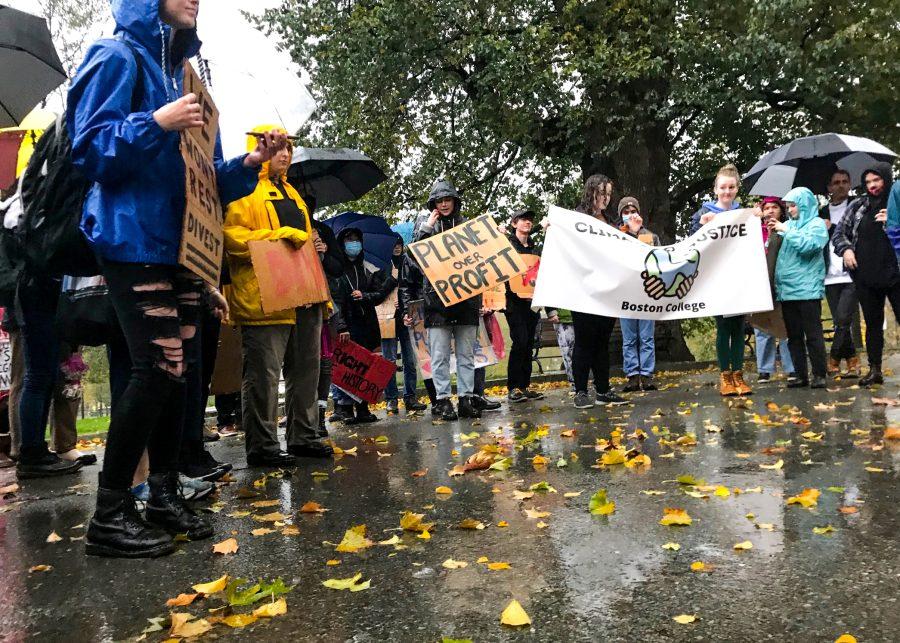As rain beat down upon them, roughly 50 students from universities all across Boston demonstrated in Boston Common to demand that their institutions divest from fossil fuels. Student representatives for climate justice organizations at Harvard, Northeastern, Boston University, Boston College, Tufts and Berklee College of Music all showed up on Friday, Nov. 12 for the collective protest.
The protest was organized by Climate Justice at Boston College, a student organization calling for Boston College to divest from fossil fuels.
“A lot of Boston colleges have yet to divest, which means stop investing in fossil fuels,” said Fiona Broadie, a junior at Boston University. “And some colleges, like Boston University, are divesting, but they’re going to take over ten years to do so, and they’re not telling their students how they’re doing it, and they’re being super vague about it. And ten years is way too long, because we don’t have that much time to stop climate change.”
UMass Boston, along with the entire UMass system, divested “its endowment from direct holdings in fossil fuels” in 2016, according to UMass Amherst’s News & Media Relations.
The protest began with an acknowledgement of the indigenous land the rally was being held on. Then, speakers who represented their schools’ various climate and divestment organizations read speeches or expressed thoughts regarding divestment at their institutions.
Two students from Fossil Fuel Divest Harvard kicked off the protest. In September, Harvard committed to divesting from fossil fuels.
“You show me that divestment is not just about stopping the bad,” said the first student representative to the crowd of protestors. “It’s also about investing in the good: building the just and sustainable world we want to see right here and right now together. This cross-campus rally is proof of that.”
The second Fossil Fuel Divest Harvard representative was also an international student from Vietnam. The representative expressed their frustration with world leaders’ behavior at COP26.
“As we are rallying here today, world leaders are convening at the 26th UN climate change conference, or COP26,” said the representative. “You know what? Actually, they are already three hours after the deadline when they were supposed to finish talking and they haven’t even come up with an agreement. And you know what issue is holding them up? Loss and damage. The fact is: rich countries, the U.S. and E.U. countries, are refusing to pay for the loss and damages that their companies have caused for the least developed, small island nations that are bearing the brunt of climate change right now.”
A representative from Berklee Climate Action also spoke to the events of COP26.
“At COP26 there are more representatives for fossil fuel organizations than there were for any f****** country,*” said the representative. “That is the maintenance of the status quo. That will make sure capitalism destroys our planet.”
Many representatives also expressed frustration at their institutions’ hypocrisy on the matter.
“The irony is not lost when it is our own professors who publish research on the damage of the current climate crisis while our own aging administration does not feel the urgency as they play with our future,” said a representative from Divest BU.
“We are tired of greenwashing, we are tired of hypocrisy, and we are tired of being ignored and dismissed,” said a representative from Tufts Climate Action. “Our universities tell us that we’re the leaders of tomorrow but they’re actively destroying our future.”
“Each of our colleges teach us all to be leaders, but we need to call for them to be leaders, too, in the efforts for climate justice,” said a representative from EcoPledge, another BC student-run sustainability organization.
After more than an hour in inclement weather conditions, a representative from Climate Justice Boston College closed out the protest.
“Today we fight for everybody who doesn’t have the luxury of protesting,” said the representative. “We fight for every frontline community already being impacted—the people who have been historically ignored by our government and people in power, and we demand that we will not be ignored as well. But most importantly, we fight for all of our people.”
*Fact Verified: The BBC states that 503 people with connections to the fossil fuel industry attended COP26, while Brazil, the nation with the largest team of negotiators, had 479 delegates.

